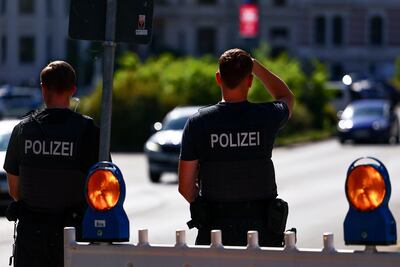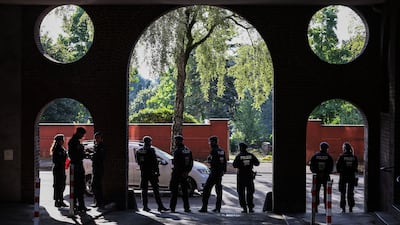A growing number of Syrian migrants in Germany have been linked to organised crime, police say, as efforts to deport them gather pace.
Detectives are probing seven alleged Syrian "crime clans" in an underworld traditionally dominated by gangs from Turkey and Lebanon.
More than 200 Syrians were declared suspects in organised crime investigations last year, according to new figures published on Thursday. It comes amid swirling pressure on Chancellor Olaf Scholz to quell voter anger over migration, after a historic far-right election victory in the former East.
Ministers have made deportation flights to Syria a key objective, after a batch of convicted criminals were sent back to Afghanistan for the first time since 2021. "We have a rising number of non-German suspects. As well as systematic law enforcement, this is also about deportations," the Interior Minister Nancy Faeser said as she unveiled the annual report on organised crime.
Hundreds of thousands of Syrians claimed asylum in Germany amid the 2015 refugee crisis, many of whom have integrated well and taken up German nationality. A renewed wave of Syrian asylum claims began in 2021, with more than 100,000 filed last year. Many have received only interim protection.
The head of the Federal Criminal Police Office, Holger Münch, said the rise in Syrians being identified in gang crime investigations was part of a trend in which the number of non-German suspects rose by about 11 per cent last year.
Foreign links
The drugs trade is at the heart of Germany's underworld and more than two thirds of investigations find links abroad, he said. According to the figures there were 219 Syrian suspects in organised crime investigations last year, up from 136 a year earlier.
They made up a quarter of all migrant suspects, with people from Albania, Turkey, Georgia and Lebanon the next most common nationalities apart from Germans. Detectives have also uncovered a growing Syrian element in the "crime clans" that have become notorious in Germany's underworld and most commonly have a Mhallami ethnic background from Turkey or Lebanon.

Several members of one family with roots in Lebanon – the Remmo clan – were convicted last year for a spectacular 2019 jewel robbery at the historic Green Vault in Dresden. The gang was also linked to the theft of a giant gold coin from a Berlin museum.
While five of the 44 gangs under investigation are classed as primarily Lebanese, detectives are now studying more predominantly Syrian clans, with seven. There are 14 where the "dominating nationality" is Turkish. Among individuals suspected of clan crime there were 72 Syrians, up from 46 the previous year.
Smuggling gangs
As border police try to stop Syrians being smuggled into Germany, many of those accused of trafficking them across the border have proved to be fellow Syrians. Out of 58 smuggling investigations last year, 13 focused on alleged Syrian perpetrators.
Three Syrians and two Iraqis were arrested in raids by border police on Wednesday on a gang accused of smuggling at least 140 people into Germany. Gangland criminal activities also include killings, robberies, extortion, money laundering, people smuggling and corruption.

Ms Faeser said Germany was applying the "greatest investigative pressure possible" to crack down on the gangs. Her ministry has pushed through new laws that allow for people linked to gang crime to be deported even if they individually have not been convicted.
Organised crime groups are "increasingly prepared to use sometimes drastic violence" and act in a "conspiratorial and internationally connected" way, she said.
More than 6,000 Syrians have no legal right to stay in Germany, but there are no formal diplomatic relations and deportation flights were stopped in 2012 due to the civil war. Many have a "toleration" status that means they cannot be deported in practice.
Mr Scholz's government has not revealed how it intends to work around this but recently staged a first deportation to Afghanistan since 2021, after secret talks with Qatar and other regional partners, in which 28 convicted criminals were expelled.
Right-wing politicians have seized on one court ruling in July, in which judges said Damascus and other parts of Syria were not too dangerous to live in, to press for large numbers of Syrians to be denied asylum in Germany and returned home.


